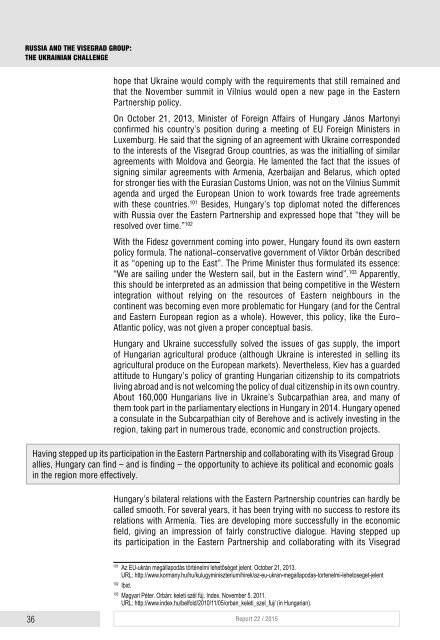RIAC-Visegrad-Report22-Eng
RIAC-Visegrad-Report22-Eng
RIAC-Visegrad-Report22-Eng
You also want an ePaper? Increase the reach of your titles
YUMPU automatically turns print PDFs into web optimized ePapers that Google loves.
RUSSIA AND THE VISEGRAD GROUP:THE UKRAINIAN CHALLENGEhope that Ukraine would comply with the requirements that still remained andthat the November summit in Vilnius would open a new page in the EasternPartnership policy.On October 21, 2013, Minister of Foreign Affairs of Hungary János Martonyiconfirmed his country’s position during a meeting of EU Foreign Ministers inLuxemburg. He said that the signing of an agreement with Ukraine correspondedto the interests of the <strong>Visegrad</strong> Group countries, as was the initialling of similaragreements with Moldova and Georgia. He lamented the fact that the issues ofsigning similar agreements with Armenia, Azerbaijan and Belarus, which optedfor stronger ties with the Eurasian Customs Union, was not on the Vilnius Summitagenda and urged the European Union to work towards free trade agreementswith these countries. 101 Besides, Hungary’s top diplomat noted the differenceswith Russia over the Eastern Partnership and expressed hope that “they will beresolved over time.” 102With the Fidesz government coming into power, Hungary found its own easternpolicy formula. The national-conservative government of Viktor Orbán describedit as “opening up to the East”. The Prime Minister thus formulated its essence:“We are sailing under the Western sail, but in the Eastern wind”. 103 Apparently,this should be interpreted as an admission that being competitive in the Westernintegration without relying on the resources of Eastern neighbours in thecontinent was becoming even more problematic for Hungary (and for the Centraland Eastern European region as a whole). However, this policy, like the Euro-Atlantic policy, was not given a proper conceptual basis.Hungary and Ukraine successfully solved the issues of gas supply, the importof Hungarian agricultural produce (although Ukraine is interested in selling itsagricultural produce on the European markets). Nevertheless, Kiev has a guardedattitude to Hungary’s policy of granting Hungarian citizenship to its compatriotsliving abroad and is not welcoming the policy of dual citizenship in its own country.About 160,000 Hungarians live in Ukraine’s Subcarpathian area, and many ofthem took part in the parliamentary elections in Hungary in 2014. Hungary openeda consulate in the Subcarpathian city of Berehove and is actively investing in theregion, taking part in numerous trade, economic and construction projects.Having stepped up its participation in the Eastern Partnership and collaborating with its <strong>Visegrad</strong> Groupallies, Hungary can find – and is finding – the opportunity to achieve its political and economic goalsin the region more effectively.Hungary’s bilateral relations with the Eastern Partnership countries can hardly becalled smooth. For several years, it has been trying with no success to restore itsrelations with Armenia. Ties are developing more successfully in the economicfield, giving an impression of fairly constructive dialogue. Having stepped upits participation in the Eastern Partnership and collaborating with its <strong>Visegrad</strong>101Az EU-ukrán megállapodás történelmi lehetőséget jelent. October 21, 2013.URL: http://www.kormany.hu/hu/kulugyminiszterium/hirek/az-eu-ukran-megallapodas-tortenelmi-lehetoseget-jelent102Ibid.103Magyari Péter. Orbán: keleti szél fúj. Index. November 5, 2011.URL: http://www.index.hu/belfold/2010/11/05/orban_keleti_szel_fuj/ (in Hungarian).36 Report 22 / 2015


